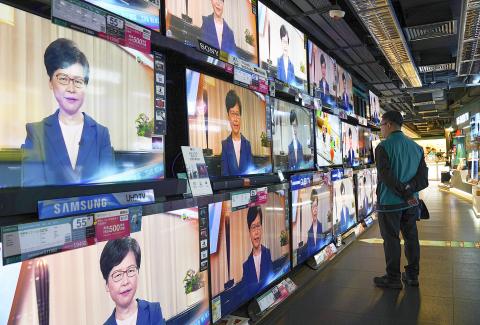Hong Kong Chief Executive Carrie Lam (林鄭月娥) yesterday said that her government would formally withdraw an extradition bill that has ignited months of protests.
In a five-minute televised address, Lam said that her government would withdraw the bill to “fully allay public concerns.”
“Our citizens, police and reporters have been injured during violent incidents,” Lam said. “There have been chaotic scenes at the airport and [mass transit railway] stations; roads and tunnels have been suddenly blocked.”

Photo: AP
“Visitors wonder whether our city is still a safe place for travel or business. Families and friends have been under stress and arguments have flared. For many people, Hong Kong has become an unfamiliar place,” she added.
Lam shelved the bill in June and in July said that it was “dead,” but has until now refused to withdraw it entirely, a key demand of the protesters who said it could be revived.
By formally withdrawing the bill, Lam conceded to one of five key demands of the demonstrators, but did not concede to the others, which include an independent inquiry into police behavior, amnesty to those arrested and democratic reforms to give Hong Kong residents universal suffrage.
Lam said that she did not believe the government should establish an inquiry to look into police behavior, deferring to the Independent Police Complaints Council, to which she said she would add two new members.
Instead, Lam said that her government would open a platform for dialogue, inviting community leaders, experts and others to investigate social issues and advise the government.
“After more than two months of social unrest, it is obvious to many that discontentment extends far beyond the bill,” she said.
As news of the bill’s withdrawal spread, riot police were seen patrolling metro stations as some protesters called for people to gather at various stations.
“Of course I won’t accept it. We have five demands. We want all of them, not one less. The most important issue to be solved is the police abuse of power,” a protester named Alan said.
A survey released yesterday of private business activity showed the “steepest deterioration in the health of the private sector since February 2009.”
Ahead of Lam’s speech, Hong Kong’s Hang Seng Index jumped 4 percent.
University and secondary students this week launched a class boycott and protesters have planned further action in the weeks ahead, including another attempt to paralyze the airport and a rally outside the US consulate to call on lawmakers to pass legislation that would sanction officials deemed as suppressing freedom or human rights in Hong Kong.
Protesters remained suspicious of Lam’s concession.
“She’s just doing this to try and disintegrate the movement. A lot of people think that,” a protester named Katya said. “The situation has escalated to a point where not even Beijing knows how to sort this, so they’re using different tricks and lies. Hong Kong people have learned to ignore her.”
Additional reporting by AP

DAREDEVIL: Honnold said it had always been a dream of his to climb Taipei 101, while a Netflix producer said the skyscraper was ‘a real icon of this country’ US climber Alex Honnold yesterday took on Taiwan’s tallest building, becoming the first person to scale Taipei 101 without a rope, harness or safety net. Hundreds of spectators gathered at the base of the 101-story skyscraper to watch Honnold, 40, embark on his daredevil feat, which was also broadcast live on Netflix. Dressed in a red T-shirt and yellow custom-made climbing shoes, Honnold swiftly moved up the southeast face of the glass and steel building. At one point, he stepped onto a platform midway up to wave down at fans and onlookers who were taking photos. People watching from inside

A Vietnamese migrant worker yesterday won NT$12 million (US$379,627) on a Lunar New Year scratch card in Kaohsiung as part of Taiwan Lottery Co’s (台灣彩券) “NT$12 Million Grand Fortune” (1200萬大吉利) game. The man was the first top-prize winner of the new game launched on Jan. 6 to mark the Lunar New Year. Three Vietnamese migrant workers visited a Taiwan Lottery shop on Xinyue Street in Kaohsiung’s Gangshan District (崗山), a store representative said. The player bought multiple tickets and, after winning nothing, held the final lottery ticket in one hand and rubbed the store’s statue of the Maitreya Buddha’s belly with the other,

‘NATO-PLUS’: ‘Our strategic partners in the Indo-Pacific are facing increasing aggression by the Chinese Communist Party,’ US Representative Rob Wittman said The US House of Representatives on Monday released its version of the Consolidated Appropriations Act, which includes US$1.15 billion to support security cooperation with Taiwan. The omnibus act, covering US$1.2 trillion of spending, allocates US$1 billion for the Taiwan Security Cooperation Initiative, as well as US$150 million for the replacement of defense articles and reimbursement of defense services provided to Taiwan. The fund allocations were based on the US National Defense Authorization Act for fiscal 2026 that was passed by the US Congress last month and authorized up to US$1 billion to the US Defense Security Cooperation Agency in support of the

HIGH-TECH DEAL: Chipmakers that expand in the US would be able to import up to 2.5 times their new capacity with no extra tariffs during an approved construction period Taiwan aims to build a “democratic” high-tech supply chain with the US and form a strategic artificial intelligence (AI) partnership under the new tariffs deal it sealed with Washington last week, Taipei’s top negotiator in the talks said yesterday. US President Donald Trump has pushed Taiwan, a major producer of semiconductors which runs a large trade surplus with the US, to invest more in the US, specifically in chips that power AI. Under the terms of the long-negotiated deal, chipmakers such as Taiwan Semiconductor Manufacturing Co (TSMC, 台積電) that expand US production would incur a lower tariff on semiconductors or related manufacturing